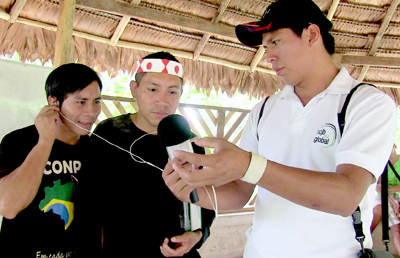 |
| Terena tribal member Jasiel Martins (right) teaches the proper use of a microphone to Shapu Meo (left) of the Matis tribe while a local missionary looks on. |
(Oct. 19, 2012 - stories by Ralph Kurtenbach) "The Reverend Mother always says, 'When the Lord closes a door, somewhere He opens a window'" (Maria in The Sound of Music).
When the indigenous Ticuna believers in Brazil found their chances of ever being granted a license for low-power community FM station frequencies were slim, the news dimmed their prospects of evangelizing their tribal neighbors.
Brazil's broadcasting authority has stopped issuing frequencies for now, according to HCJB Global missionary Larry Buckman who ministers among the Ticuna and other tribes, including the Terena. "The Ticuna probably didn't try introducing a request because they knew the government froze the frequencies," he said.
Allen Graham, an audio production trainer with HCJB Global, added that "even though they are in an area where there is not a lot of congestion on the FM band, and even though they'd be low-power FM, the decision was to issue no licenses."
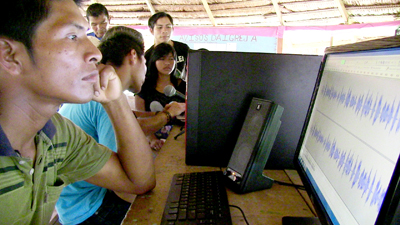 |
| Roy Cruz João of the Ticuna tribe views and edits an audio voice track on the computer monitor in a learning center that HCJB Global set up in a thatch-roofed church. |
Reflecting upon that perceived setback, Graham related, "But as it turned out, as one door closed, God was opening an even bigger door. And that was through solar-powered MP3-like digital audio players that do not require a license in Brazil."
Graham, director of radio training for the Latin America Region, provided more instruction in audio production to Brazil's indigenous people in August. Teaming up with him in Filadélfia-a town in Brazil's Amazonas state near the Colombian and Peruvian borders-was Jasiel Martins, a Terena believer who learned the audio production skills from Graham at a training session just four years ago.
But instead of aiming their efforts toward radio stations, these evangelicals have turned to "plan B"-placing programming onto the small audio players known as El Mensajero (The Messenger).
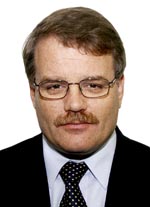 |
| Ian Currey |
"Our [Messenger] players are usually loaded with the whole New Testament, 30 half-hour 'life principle' messages and [usually 32] discipleship messages, each about 40 minutes long," explained Ian Currey, In Touch Ministries' executive director of international outreach. In Touch is an Atlanta-based organization that has agreed to cover costs of the small audio playback devices.
"HCJB Global is coming alongside in order to provide the training on how to produce the programs which will then go onto the audio players that are distributed in these communities," added Graham.
In Filadélfia the group produced pilot programs that they played for people at the market in a nearby village. "They took the programs to the Ticuna, and the people liked them," Graham said. "People said they could use them, so our students knew that all the blood, sweat and tears of the previous days had been worth it."
Buckman, who grew up in Brazil and returned to minister there several years ago, considers the indigenous people's zeal to spread the gospel the "third wave" of evangelism in that South American country. Missionaries from Scotland evangelized the Terena people beginning a century ago with subsequent evangelistic and discipleship outreach by both foreign missionaries and non-tribal Brazilians.
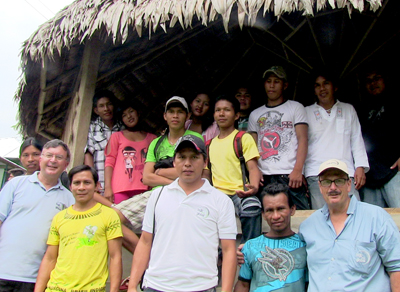 |
| Staff and students pose during the program production class held recently in Filadélfia in Brazil's Amazonas state. |
Graham finds it exciting to see the indigenous people seizing opportunities around them for evangelism, realizing that their opportunity for reconciliation with God came about through someone else's efforts.
"They now see that it is their responsibility to take the gospel to other tribes within Brazil so that they have an opportunity to receive Christ," he explained. "They also realize that they have a much better opportunity to do that than would a missionary from outside Brazil or even a non-indigenous person."
Sidebar: Young Missionary Couple Eager to Distribute Audio Players in Amazon BasinWhen Matt Parker talks about the "Brazil Amazon Players of Hope," he's not referring to a soccer team. Rather, the "players" are MP3-like digital audio players that he anticipates delivering to Brazil's ribeirinhos (river dwellers) who live along the Amazon and its tributaries.
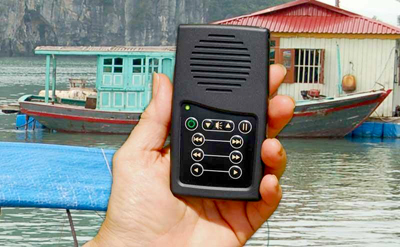 |
| Matt and Anabella Parker are preparing to hand out at least 120 of these solar-powered digital audio players to Brazil's river people. |
Matt grew up as a child of missionary parents, Richard and Kimberly Parker, who direct a ministry called Services of Evangelism and Assistance to the River People of the Amazon (SEARA).
Of the 35,000 or so communities in the Amazon Basin, 30,000 have yet to be reached and need the gospel of Jesus Christ, according to Richard. No local Christian radio stations have been established, and there aren't enough trained believers to meet the ongoing discipleship needs.
"Matt gave us the idea of using the players to record discipleship materials and give to new converts," explained Richard, who had earlier pursued some radio station licenses. "We were wondering what we were going to do because we had already sent down an engineer who said an FM station would be perfect and that it would reach all of them. We thought it was meant to be, but God had different plans, so we have now switched to solar-powered MP3 players."
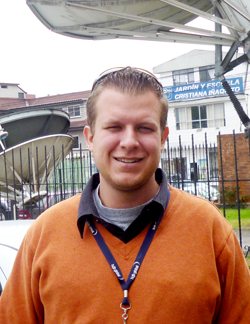 |
| Matt Parker at Radio Station HCJB's campus in Quito, Ecuador. |
Villagers living along the many waterways in the Amazon Basin depend on the river to meet many of their basic needs-fish to eat, water to drink. "Most of their income comes from fishing, agriculture or lumber," added Matt. "They cut down trees and with a chainsaw. They can cut boards as straight as any [sawmill] can, and they sell it to people on boats that come down the river." For many, education and medical help is a good distance away, and many residents attain only an eighth-grade education.
"With our evangelistic boat, we visit each village [in our area] about six times annually," Richard explained. "We are currently reaching 50 villages. In strategic communities where the gospel has been well accepted, we locate a missionary family who has had proper training from either our Missionary Training Institute on the east coast of Brazil or from our 'floating seminary.'"
Each year about 200 river dwellers put their faith in Christ through the Parkers' ministry. This, Richard said, "leaves us with the huge task of trying to disciple the new believers effectively. Where we have missionaries working full time, we can handle the task, but where our boat only visits for approximately 24 hours, six times per year, it is extremely difficult."
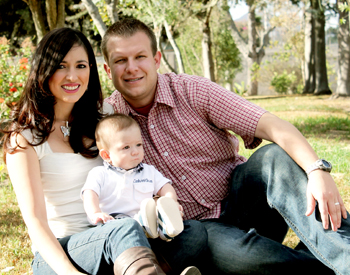 |
| HCJB Global missionaries Matt and Anabella Parker with their son, Dustin. |
Matt and his Ecuadorian wife, Anabella, plan to deliver at least 120 of the solar-powered digital audio players (called Messengers) to some of Brazil's river dwellers in December. The players will contain audio recordings from MegaVoice, a ministry that distributes the players and offers an expansive Scripture audio library.
"We're going to upload up to 4 gigabytes worth of programming [onto each Messenger]," he said. That's going to be the entire Bible in Portuguese and what they call the 'College Bible Course' which is 252 programs-classes-that walk the ribeirinhos through the Bible."
Mentioning "Amazon" doesn't draw Matt off to pondering online purchases of Christmas gifts for Anabella and their new son, Dustin. To them it means making known a greater gift to the river people of Brazil.
Source: HCJB Global
